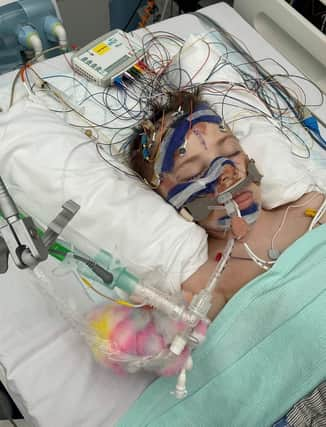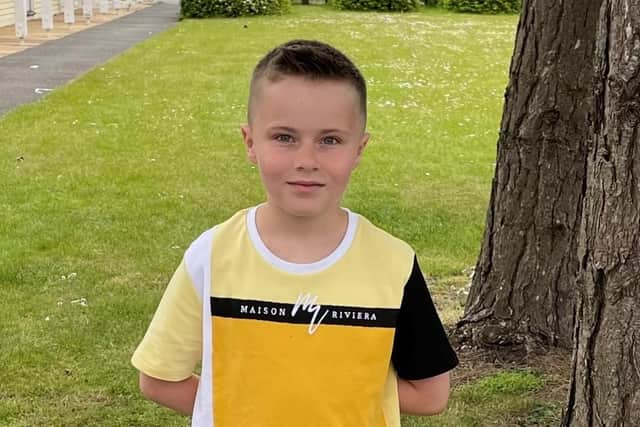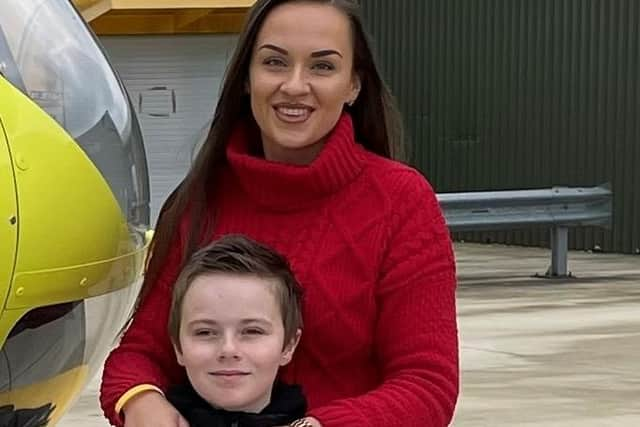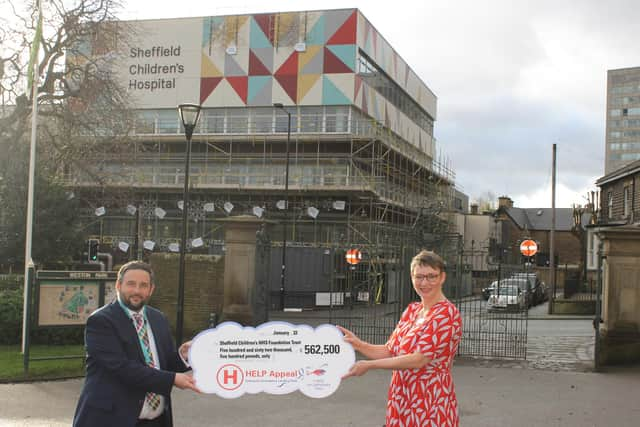Eight year old Doncaster boy who fell into a coma after he was hit by a car was saved by an air ambulance


Sheffield Children’s Hospital has announced this week it has raised almost half the money needed for a helipad to speed up the process of giving emergency treatment to young patients like Rio.
His mum Natalie said: “Rio was walking with a friend to the playing fields opposite our house when he was hit by a car. His friend ran back to get me.
Advertisement
Hide AdAdvertisement
Hide Ad“The air ambulance intercepted the 999 call and arrived within minutes.”


Rio was intubated and ventilated at the scene by the air ambulance doctor.
The nearest Major Trauma Centre was Sheffield Children’s which can take up to 45 minutes by road from the scene of the accident. Thanks to the air ambulance, it took just six minutes.
Young people are transferred to Sheffield Children’s by air ambulance by landing in the public park opposite. Patients are then stretchered across the busy A57 to the Emergency Department. The delays landing meant that mum Natalie, who travelled with the police as there was no room in the air ambulance, arrived in time to see it all happen.
Advertisement
Hide AdAdvertisement
Hide AdNatalie continued: “The police had to clear the area and someone from the Trauma team had to stop traffic so they could stretcher him across. I couldn’t tell you how long exactly it was, it was all a bit of a blur, but it felt like the longest time of my life.”


Rio was then met by the Trauma team at Sheffield Children’s which includes staff from the Emergency Department, Paediatric Critical Care Unit and surgical team as well as specialists in anaesthetics and neurosurgery. It also included members from the blood bank and radiology teams as well as porters.
Natalie added: “There were instantly so many people around Rio, they all knew their roles and sprung into action so quickly, and the doctor from the air ambulance briefed them too.”
Rio had an Intracranial Bolt fitted to monitor the building pressure inside his skull, before moving onto the Intensive Care Unit at Sheffield Children’s where he spent the next five days in an induced coma.
Advertisement
Hide AdAdvertisement
Hide AdNatalie said: “They talk you through the worst-case scenarios, but I tried to keep positive. When they started to reduce the medication, one of the doctors said ‘we’ll just have to see how he wakes up, or if he wakes up’.


“I just thought to myself ‘he must wake up’ and thankfully he did. He was agitated and confused, but it was such a relief to see his eyes open again. I was just so grateful he was still here.”
After regaining consciousness, Rio was moved to the High Dependency Unit at Sheffield Children’s, before being moved onto the dedicated neurosciences ward, Ward 5. He was diagnosed with Acquired Hydrocephalus and initially had an external drain fitted to relieve the pressure in his brain, which was then replaced by a permanent shunt.
Rio also required the use of a wheelchair and a frame, with reconstructive surgery meaning that two pins were placed into his leg. In total, his stay at Sheffield Children’s lasted almost six weeks and once home he began weekly physiotherapy at his local hospital and occupational therapy at home.
Advertisement
Hide AdAdvertisement
Hide AdNatalie continued: “Thankfully, he’s now caught up with school and his teachers are happy with his progress. He still gets very emotional and worries about things he shouldn’t, but we’re both still dealing with the trauma of it all.”
Today, Rio wishes to be an artist- he’s passionate about drawing and arts and crafts, with his latest creation a teddy made from a sock. He also enjoys playing video games and watching films on Netflix.
John Armstrong, Chief Executive Officer at The Children’s Hospital Charity said: “As Rio’s powerful story shows, the Emergency Department at Sheffield Children’s provides outstanding critical care for patients across the region.
“By funding this new Helipad, together we can ensure children can access that treatment as quickly as possible with dignity, and we are so grateful to Robert and the HELP Appeal for their incredibly generous donation today which makes our dream one step closer to reality.”
Advertisement
Hide AdAdvertisement
Hide AdThe hospital moved a huge step closer to building a new Helipad at Sheffield Children's thanks to a huge donation from the Help Appeal - County Air Ambulance Trust.
They have donated £562,500, which takes their total support to The Children’s Hospital Charity’s appeal to £2.25M.
With over half the cost of the new Helipad raised, we hope with your support we can complete the fundraising this year and the new facility can open in 2023.
Currently, air ambulances land in Weston Park where critically patients are then transported across a busy road under a police escort before entering the Emergency Department at Sheffield Children’s
Advertisement
Hide AdAdvertisement
Hide AdRobert Bertram, Chief Executive of the HELP Appeal said: “Having a rooftop helipad situated above the Emergency Department at this Major Trauma Centre will be a game changer. A new helipad will provide dignity for patients and quick access to the specialist care they need, instead of relying on good weather for landing in the park opposite. Helipads can and do save lives.”
The Helipad will reduce the delays for patients who need urgent critical care as soon as possible from across South Yorkshire, Derbyshire and Lincolnshire.
To support their appeal, please visit: www.tchc.org.uk/donate